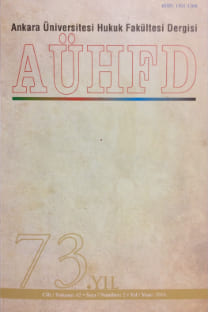The International Criminal Court and the Effects of the Court on Turkey
Roma Statüsü, Uluslararası Ceza Divanı, Uluslararası ceza hukuku, Tamamlayıcılık prensibi
The International Criminal Court and the Effects of the Court on Turkey
Rome Statute, International Criminal Court, International criminal law, Principle of complementarity,
___
- Akipek, Ömer İlhan, Meşru Müdafaanın Mahiyeti ve Benzeri Müesseselerle Mukayesesi, Ankara: AÜHF Yayınları No. 82, 1955.
- Bassiouni, M.Cherif, Crimes Against Humanity in International Criminal Law, Dordrecht: Martinus Nijhoff, 1992.
- ----, “Symposium: Negotiating the Treaty of Rome on the Establishment of an International Criminal Court,” Cornell International Law Journal, Sayı 32, Yıl 1999, s. 461-469.
- ----, “Explanatory note on the ICC Statute,” International Review of Penal Law, Reprint, Volume 71, 2000.
- Compatibility of National Legal Systems with the Statute of the Permanent International Criminal Court, Volume II, 16th International Congress, Rome (Italy), 1-5 April 2003, International Society for Military Law and the Law of War, Brussels, 2003.
- Coté, Luc, “International criminal justice: tightening up the rules of the game,” International Review of the Red Cross, Volume 88, Number 861, March 2006, s. 133-144.
- Dönmezer, Sulhi – Sahir Erman, Nazari ve Tatbiki Ceza Hukuku, Onbirinci Bası, İstanbul: Beta Basım Yayım Dağıtım A.Ş., 1994.
- İnan, Yüksel, Uluslararası Adalet Divanının Yargı Yetkisi, Ankara: Ankara İktisadi ve Ticari İlimler Akademisi Gazetecilik ve Halkla İlişkiler Yüksek Okulu Basımevi, 1982.
- Martinez, Lucy, “Prosecuting Terrorists at the International Criminal Court: Possibilities and Problems,” Rutgers Law Journal, Sayı 34, Yıl 2002, s. 13-19.
- Posse, Hortensia D.T. Gutierrez, “The relationship between international humanitarian International Review of the Red Cross, Volume 88, Number 861, March 2006, s. 65-86. the international criminal tribunals,”
- Proulx, Vincent-Joel, “Rethinking the Jurisdiction of the International Criminal Court in the post-September 11th Era: Should Acts of Terrorism Qualify As Crimes Against Humanity?” American University International Law Review, Sayı 19, Yıl 2004, 1025-1039.
- Rome Statute of the International Criminal Court, United Nations Diplomatic Conference of Plenipotentiaries on the Establishment of an International Criminal Court, July 17, 1998, UN Doc. A/CONF.183/9, 37 I.L.M. icc/index.html. available at
- http://www.un.org/law/
- Uluslararası Ceza Divanı ve Uluslara Arası Ceza Yargılaması, Harp Akademileri Yayını, İstanbul: Harp Akademileri Basımevi, 2003. UN Doc. A/CONF.183/9, http://www.un.org/law/icc/index.html. 37 I.L.M. 999 (1998), at
- Wengi, Zhu, On co-operation by states not party to the International Criminal Court, International Review of the Red Cross, Volume 88, Number 861, March 2006, s. 87-110.
- ISSN: 1301-1308
- Yayın Aralığı: 4
- Başlangıç: 1943
- Yayıncı: Ankara Üniversitesi Hukuk Fakültesi
XII. YÜZYIL RÖNESANSI VE “YENIDEN DOĞAN” ROMA’YI GÜNÜMÜZE BAĞLAYAN SON HALKA: PANDEKT HUKUKU
The Road- Map of Turkey About Refuge: The National Action Plan
RESTITUTION OF FORFEITED RIGHTS (Judicial Records Code Nr.5352 Article 13/A)
İŞÇİ ÜCRETLERİNİN ÖDENMEMESİNİN HUKUKİ SONUÇLARI
The International Criminal Court and the Effects of the Court on Turkey
